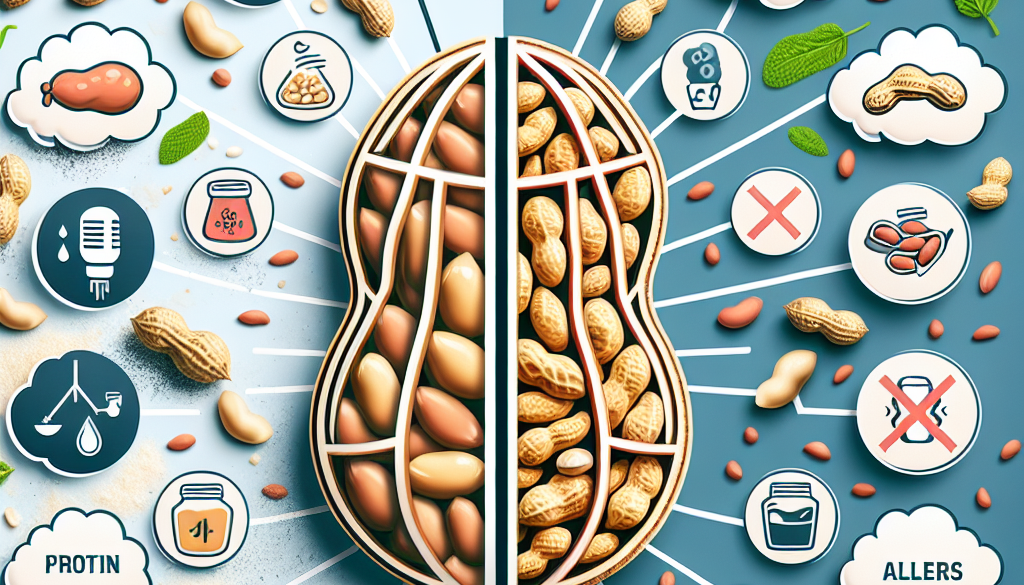Are Boiled Peanuts Bad for You? Nutritional Debate
-
Table of Contents
- Boiled Peanuts: Nutritional Debate on Their Health Impacts
- Understanding the Nutritional Content of Boiled Peanuts
- Health Benefits of Boiled Peanuts
- Potential Drawbacks of Boiled Peanuts
- Comparative Studies and Expert Opinions
- Boiled Peanuts in a Balanced Diet
- Conclusion: The Verdict on Boiled Peanuts
- Discover ETprotein’s High-Quality Protein Products
Boiled Peanuts: Nutritional Debate on Their Health Impacts

Boiled peanuts, a popular snack in various parts of the world, particularly in the southern United States, have sparked a nutritional debate. Are they a healthy addition to your diet, or should they be consumed with caution? This article delves into the nutritional profile of boiled peanuts, examines their health benefits and potential drawbacks, and provides a balanced perspective on whether they are good or bad for you.
Understanding the Nutritional Content of Boiled Peanuts
Boiled peanuts are simply raw peanuts that have been boiled in water, often with added salt. This preparation method affects their nutritional value in comparison to raw or roasted peanuts. Here’s a breakdown of their nutritional content:
- Calories: Boiled peanuts are lower in calories than their roasted counterparts due to their higher water content.
- Protein: They are a good source of plant-based protein, essential for muscle repair and growth.
- Fiber: High in dietary fiber, boiled peanuts can aid in digestion and promote satiety.
- Fats: While peanuts contain fats, most are heart-healthy monounsaturated and polyunsaturated fats.
- Vitamins and Minerals: Boiled peanuts are rich in B vitamins, vitamin E, magnesium, potassium, and iron.
- Antioxidants: The boiling process may actually increase the bioavailability of certain antioxidants found in peanuts.
Health Benefits of Boiled Peanuts
Boiled peanuts offer several health benefits that make them a potentially valuable addition to a balanced diet:
- Heart Health: The monounsaturated and polyunsaturated fats in peanuts can help lower bad cholesterol levels, reducing the risk of heart disease.
- Weight Management: The fiber and protein content in boiled peanuts can help you feel full longer, potentially aiding in weight management.
- Blood Sugar Control: Boiled peanuts have a low glycemic index, which means they have a minimal impact on blood sugar levels.
- Antioxidant Properties: Peanuts contain resveratrol, coumaric acid, and other antioxidants that may reduce the risk of chronic diseases.
Potential Drawbacks of Boiled Peanuts
Despite their benefits, there are some considerations to keep in mind when consuming boiled peanuts:
- Sodium Content: Commercially prepared boiled peanuts can be high in sodium, which can be a concern for individuals with hypertension.
- Allergies: Peanuts are a common allergen, and individuals with peanut allergies should avoid them altogether.
- Caloric Density: While lower in calories than roasted peanuts, boiled peanuts are still calorie-dense and should be consumed in moderation.
- Aflatoxins: Peanuts can be susceptible to a type of mold that produces aflatoxins, which are harmful in high amounts. Proper preparation and sourcing can minimize this risk.
Comparative Studies and Expert Opinions
Research comparing the health effects of boiled peanuts to other forms of peanuts is limited. However, experts generally agree that the method of preparation can influence the nutritional benefits of peanuts. For instance, boiling peanuts has been shown to increase the polyphenol content, which may enhance their antioxidant capacity. On the other hand, roasting has been found to reduce certain nutrients due to the high temperatures involved.
It’s important to consider individual dietary needs and health goals when incorporating boiled peanuts into your diet. For those looking to reduce sodium intake, unsalted boiled peanuts would be a better choice. Additionally, individuals with a higher risk of heart disease may benefit from the lipid-lowering effects of peanuts.
Boiled Peanuts in a Balanced Diet
When consumed as part of a balanced diet, boiled peanuts can be a nutritious snack option. Here are some tips for incorporating them healthily:
- Choose unsalted or low-sodium varieties to keep your salt intake in check.
- Be mindful of portion sizes to avoid excessive calorie consumption.
- Pair boiled peanuts with other healthy foods, such as fruits and vegetables, for a well-rounded snack.
- Consider the source of your peanuts and opt for those less likely to contain aflatoxins.
Conclusion: The Verdict on Boiled Peanuts
In conclusion, boiled peanuts can be a healthy snack when consumed in moderation and as part of a diverse diet. They offer a range of nutrients and health benefits, particularly for heart health and weight management. However, it’s essential to be aware of the potential drawbacks, such as high sodium content and allergen concerns. By making informed choices about preparation and portion sizes, you can enjoy the nutritional advantages of boiled peanuts without compromising your health.
Discover ETprotein’s High-Quality Protein Products
If you’re looking to enhance your diet with additional protein sources, consider exploring ETprotein’s range of organic bulk vegan protein and plant proteins. Their products, including Organic rice protein, clear rice protein, pea protein, clear pea protein, pumpkin seed protein, sunflower seed protein, mung bean protein, and peanut protein, are characterized by a neutral taste and non-GMO, allergen-free attributes. Ideal for various industries, ETprotein’s offerings can complement your nutritional needs, whether you’re involved in sports nutrition, weight management, or general health and wellness.
About ETprotein:
ETprotein, a reputable protein Chinese factory manufacturer and supplier, is renowned for producing, stocking, exporting, and delivering the highest quality organic bulk vegan protein and plant proteins. They include Organic rice protein, clear rice protein, pea protein, clear pea protein, pumpkin seed protein, sunflower seed protein, mung bean protein, peanut protein etc. Their offerings, characterized by a neutral taste, non-GMO, allergen-free attributes, cater to a diverse range of industries. They serve nutraceutical, pharmaceutical, cosmeceutical, veterinary, as well as food and beverage finished product distributors, traders, and manufacturers across Europe, USA, Canada, Australia, Thailand, Japan, Korea, Brazil, and Chile, among others.
ETprotein specialization includes exporting and delivering tailor-made protein powder and finished nutritional supplements. Their extensive product range covers sectors like Food and Beverage, Sports Nutrition, Weight Management, Dietary Supplements, Health and Wellness Products, and Infant Formula, ensuring comprehensive solutions to meet all your protein needs.
As a trusted company by leading global food and beverage brands and Fortune 500 companies, ETprotein reinforces China’s reputation in the global arena. For more information or to sample their products, please contact them and email sales(at)ETprotein.com today.












